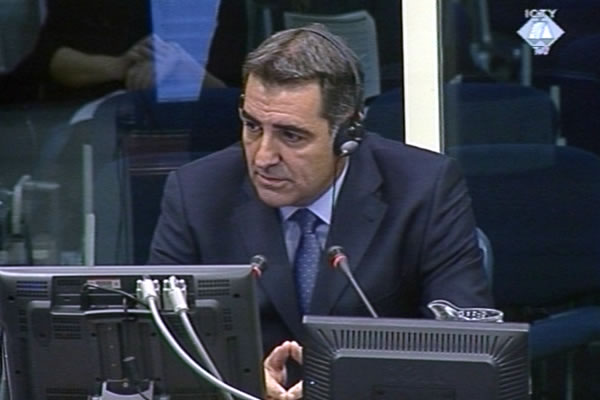Home
CROATIAN BUSINESSMEN IN CERMAK’S DEFENSE
Mladen Vedris and Nadan Vidosevic, respectively the former and current chairmen of the Croatian Chamber of Commerce, described Ivan Cermak, their former colleague from various business and political entities as ‘a key, exceptional’ person. According to them, Cermak was sent to Knin with the task to normalize civilian life after Operation Storm. Was Stipe Mesic right when he called Tudjman a dictator?
 Nadan Vidošević, svjedok odbrane Ivana Čermaka
Nadan Vidošević, svjedok odbrane Ivana Čermaka Despite his fame, the current president of the Croatian Chamber of Commerce and presidential candidate at the upcoming presidential elections, spent only 45 minutes in the Tribunal’s courtroom today. Vidosevic’s evidence was the shortest to date in General Ivan Cermak’s defense case. When the witness appeared in the courtroom and after he had made the solemn declaration to speak the truth, Vidosevic’s written statement was admitted into evidence. Vidosevic gave this statement to the defense in May 2009. Cermak’s defense counsel Kay read out the summary for the record.
During Operation Storm, Vidosevic was minister of economy. In his statement Vidosevic explained that the liberation and reintegration of Krajina was of key importance for the Croatian economy, primarily because it made it possible to restore the transport and power supply networks. General Ivan Cermak played a key role in the effort to restart the economy in that part of Croatia after Operation Storm in August 1995, the witness said. Cermak’s role in the normalization of life in Knin and its environs, Vidosevic contended, was ‘crucial and exceptional’.
Vidosevic thus corroborated the defense’s argument that after Operation Storm, Cermak’s role as the Knin Garrison commander was primarily civilian and not military. Cermak and generals Gotovina and Markac are charged with crimes against Serbs and their property in Krajina during and after Operation Storm in the summer of 1995.
In his cross-examination Vidosevic stuck to what he had said in his statement. In Vidosevic’s words, Cermak was ‘an efficient, competent and reliable’ businessman which is why he was sent to Knin in the first place. The witness denied there was a plan to expel Serbs from Krajina. Had there been such a plan, Vidosevic noted, he and some other ministers would not have accepted it; they would have left the government. According to Vidosevic, there was no such plan and he remained a minister until September 1995 when he moved to the Chamber of Commerce.
[IMAGE]4426[/IMAGE]Vidosevic’s predecessor, former chairman of the Croatian Chamber of Commerce Mladen Vedris also gave evidence as Cermak’s defense witness. Cermak’s friend of many years, Vedris said that Cermak worked ‘as a bulldozer’ and was a key person for the normalization of life in Knin after Operation Storm.
Since Vedris described Croatia at the time of Operation Storm as ‘a young emerging democracy’, prosecutor Waespi asked him if he agreed with the current president Stipe Mesic who called Tudjman a dictator in a speech in November 2000. The witness said he didn’t agree, despite the fact that he and Mesic were friends. In Vedris’s words, Tudjman ‘had some authoritarian propensities but respected parliamentary democracy’. Although the defense objected strongly, the prosecutor was allowed to read a part of Mesic’s speech, where Mesic says Tudjman made every decision in Croatia ‘from the choice of the cabinet ministers to the choice of players in the national football team’. As the witness claimed that the Croatian authorities wanted to solve the conflict with the Serbs by peaceful means, the prosecutor wanted to show the witness Mesic’s claim that ‘some actions taken by President Tudjman antagonized Krajina Serbs’, but the judges disallowed it. Vedris continued his evidence noting that the Croatian authorities believed in coexistence with the Serbs in Krajina. However, as Vedris emphasized, ‘it takes two’ for coexistence.
Linked Reports
- Case : Gotovina et al. - "Operation Storm"
- 2009-10-30 CERMAK’S ‘REQUESTS’ TO THE POLICE
- 2009-10-29 POLICE MADE ARRESTS ONLY WHEN THEY DARED
- 2009-10-15 "A SUPERIOR DOESN’T COOPERATE, HE ORDERS"
- 2009-11-04 KRAJINA, KOSOVO AND NEW ORLEANS: SIMILAR OR DIFFERENT?
- 2009-11-05 CROATIAN POLICE WAS AFRAID
- 2009-11-06 GENERAL CERMAK ‘INCREDIBLY UNQUALIFIED’
